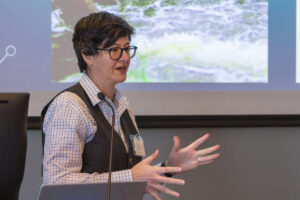Alexa Dietrich
Education:
- PhD in Anthropology – Emory University (2007)
- MPH in Epidemiology – Emory University
- AB in Anthropology – Barnard College (1996)
Position:
Program Director at Social Science Research Council
Research Associate Professor in the Department of Culture and Economy at Wagner College
Select Publications:
- Dietrich, Alexa S. 2013 The Drug Company Next Door: Pollution, Jobs, and Community Health in Puerto Rico. New York University Press.
- Dietrich, Alexa S. 2011 “Coercive Harmony, Deep Capture, and Environmental Justice in Puerto Rico.” Development & Change. 42 (6): 1441-1463.
- Dietrich, Alexa S. 2008 “Corrosion in the System: The Community Health By-Products of Pharmaceutical Production in Northern Puerto Rico.” In Killer Commodities: Public Health and the Corporate Production of Harm, M. Singer and H. Baer, eds. New York: AltaMira Press
Biography:
Alexa S. Dietrich received her PhD in medical anthropology at Emory University and MPH in epidemiology at Emory’s Rollins School of Public Health. Advised by Dr. Peter Brown, she successfully defended her dissertation in 2007 titled The Corporation Next Door: Pharmaceutical Companies in Community, Health and the Environment in Puerto Rico. She published her dissertation work into a book in 2013 titled The Drug Company Next Door: Pollution, Jobs, and Community Health in Puerto Rico. Her book utilizes medical anthropology and political ecology to explore the interactions of pharmaceutical companies in Puerto Rico with the local community and analyze how the multifaceted roles of these corporations leads to consequences of pollution and public health.
After receiving her PhD, she joined the anthropology faculty at Wagner College in 2007, where she is now a research associate professor. Her teaching interests include medical anthropology, gender and sexuality, anthropological methods, political anthropology, anthropology and public health, and anthropology in everyday life.
She is also a part of the Social Science Research Council where she serves as the program director for the Council’s Scholarly Borderlands initiative. Her research focus is in understanding the connected health between people and the environment through an emphasis in analyzing culture, especially in contexts of disasters.
